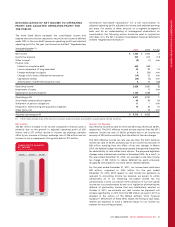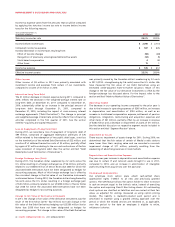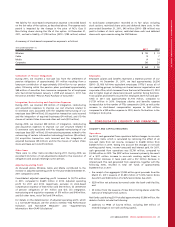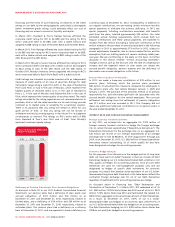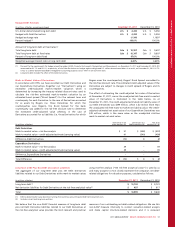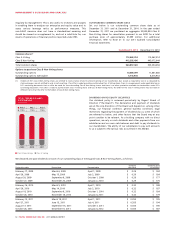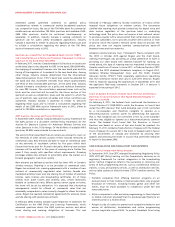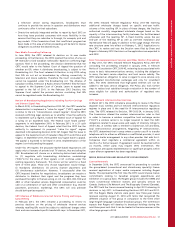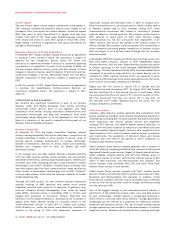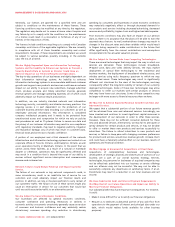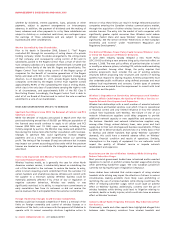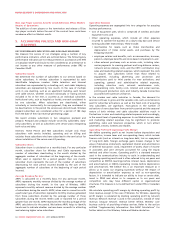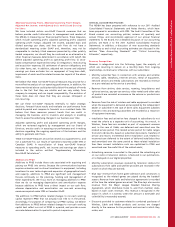Rogers 2011 Annual Report Download - page 59
Download and view the complete annual report
Please find page 59 of the 2011 Rogers annual report below. You can navigate through the pages in the report by either clicking on the pages listed below, or by using the keyword search tool below to find specific information within the annual report.
MANAGEMENT’S DISCUSSION AND ANALYSIS
Canada. The Company believes that the attempt made in options 2
and 3 to limit the reforms to “pure telecommunications” networks is
out of step with the reality of broadband markets and inconsistent
with the government’s attempt to implement a digital economy
strategy for Canada.
The government has yet to make a determination on potential
foreign ownership changes. It is expected that an announcement will
be coordinated with the release of Industry Canada’s determinations
on the appropriate structure of the 700 MHz spectrum auction
anticipated in early 2012.
Policy Direction to the CRTC on Telecommunications
In December 2006, the Minister of Industry issued a Policy Direction
on Telecommunications to the CRTC under the Telecommunications
Act. The Direction instructs the CRTC to rely on market forces to the
maximum extent feasible under the Telecommunications Act and
regulate, if needed, in a manner that interferes with market forces to
the minimum extent necessary.
2011 Legislation
Bill C-22, An act respecting the mandatory reporting of Internet child
pornography by persons who provide an Internet service, was
introduced in the House of Commons in May 2010. Bill C-22 is
intended to fight Internet child pornography by requiring Internet
service providers (“ISPs”) and other persons providing Internet
services (e.g., Facebook, Google, and Hotmail) to report any incident
of child pornography. This requirement includes the following: if a
person providing Internet services is advised of an Internet address
where child pornography may be available, the person must report
that address to the organization designated by the regulations. If a
person has reasonable grounds to believe that the Internet services
operated by that person are being used to transmit child
pornography, the person must notify the police and preserve the
computer data. Bill C-22 was passed by the House of Commons in
2010 and came into effect as law on December 8, 2011.
2010 Legislation and Associated Developments
Bill C-28, An Act to promote the efficiency and adaptability of the
Canadian economy by regulating certain activities that discourage
reliance on electronic means of carrying out commercial activities,
and to amend the Canadian Radio-television and Telecommunications
Commission Act, the Competition Act, the Personal Information
Protection and Electronic Documents Act and the Telecommunications
Act (Anti-Spam Act), passed into law on December 15, 2010.
The Bill addresses unsolicited commercial electronic mail (spam) by
prohibiting the sending of commercial electronic messages without
consent. It prohibits detrimental practices to electronic commerce,
protects the integrity of transmission data and prohibits the
installation of computer programs without consent in the course of
commercial activity. In addition, it prohibits false or misleading
commercial representations online and prohibits the collection of
personal information via unlawful access to computer systems and the
unauthorized compiling or supplying of lists of electronic addresses. It
also provides for a private right of action for businesses and
consumers with extended liability. It allows the CRTC and the
Competition Tribunal of Canada to impose administrative monetary
penalties on those who violate the respective Acts and allows for the
international sharing of information and evidence to pursue
spammers outside of Canada with our global partners. The Bill is
anticipated to come into effect in mid-2012.
Amendments to the Quebec Consumer Protection Act were passed in
December 2009 to introduce new provisions applicable to sequential
performance contracts provided at a distance, including wireless,
wireline and Internet service contracts. These amendments include
new rules on the content of such contracts, the determination of the
early cancellation fees that can be charged to customers, the use of
security deposits and the cancellation and renewal rights of the
consumers. The amendments also introduce new provisions on the
sale of prepaid cards and the disclosure of the costs of the services
and products they advertise. The amendments came into force on
June 30, 2010.
Amendments to the Manitoba Consumer Protection Act were passed
on June 15, 2011 that largely paralleled the changes to the Quebec
Consumer Protection Act described above. The Manitoba government
is currently in the process of drafting regulations under the
amendments.
Proposed Legislation
Bill C-11, An Act to amend the Copyright Act (Copyright
Modernization Act), was introduced in the House of Commons in
September 2011 and has gone to the Legislative Committee for
review. This Bill is substantially unchanged from Bill C-32 that was
introduced in June 2010 and died on the order paper with the calling
of the May 2011 election. Bill C-11 is intended to update the rights
and protections of copyright owners to better address the challenges
and opportunities of the Internet. It would clarify Internet service
providers’ liability and would require ISPs to use a “notice and notice”
regime whereby notices alleging copyright infringement sent to ISPs
would be forwarded in turn to the customers. The Bill provides for
cost recovery for notice and notice. It would make Internet sites
designed to enable illegal file sharing a violation of copyright. The
Bill would also legalize forms of copying for time shifting television
programs currently used by Cable’s customers such as PVRs, and
would permit cable operators to offer customers network PVR
technology services. The Bill would eliminate the current obligation
of broadcasters to pay for copies made for the purpose of
broadcasting.
WIRELESS REGULATION AND REGULATORY DEVELOPMENTS
Consultation on the Renewal of Cellular and Personal
Communications Services (“PCS”) Spectrum Licences
In March 2009, Industry Canada initiated a public consultation to
discuss the renewal of cellular and PCS licences that were granted
through any competitive process.
In March 2011, Industry Canada released its decisions regarding the
renewal process for cellular and PCS licences that began expiring in
March 2011, thereby concluding the consultation process initiated in
March 2009. The fundamental determinations were:
• At the end of the current licence term and where licencees are in
compliance with all conditions of licence, new cellular and PCS
licenses will be issued with a term of 20 years; and,
• The previously existing annual fee of $0.0351 per MHz per
population of the licenced area will continue to apply to all cellular
and PCS licences, including those initially assigned by auction. The
Minister of Industry Canada may review and amend the fees during
the licence term after further consultation with licencees.
A determination regarding existing research and development
conditions of licence was not released at this time and will be
released separately. A decision has not been made to date and until
such a time, the current conditions of licence remain in effect.
Consultation on a Policy and Technical Framework for the 700 MHz
Band and Aspects Related to Commercial Mobile Spectrum
In November 2010, through the release of its consultation paper,
Industry Canada initiated a consultation on a policy and technical
framework to auction spectrum in the 700 MHz band. During 2011,
2011 ANNUAL REPORT ROGERS COMMUNICATIONS INC. 55


